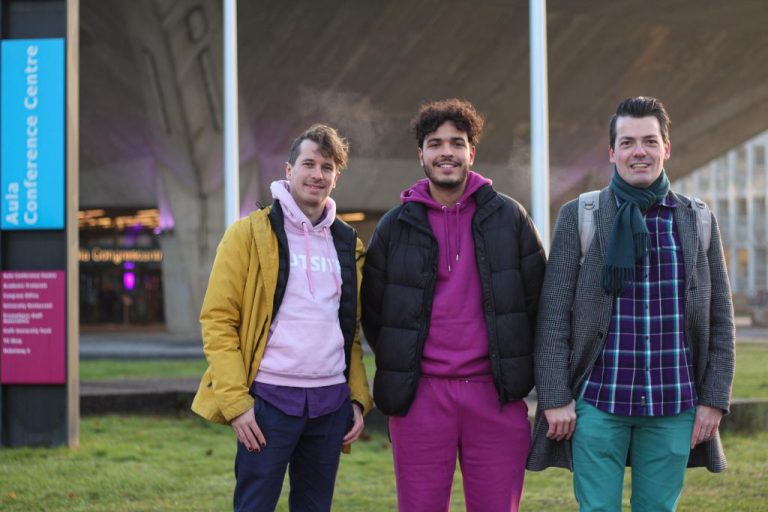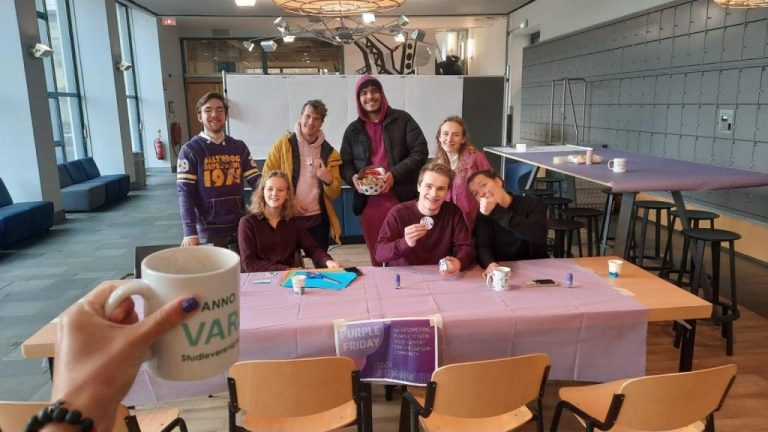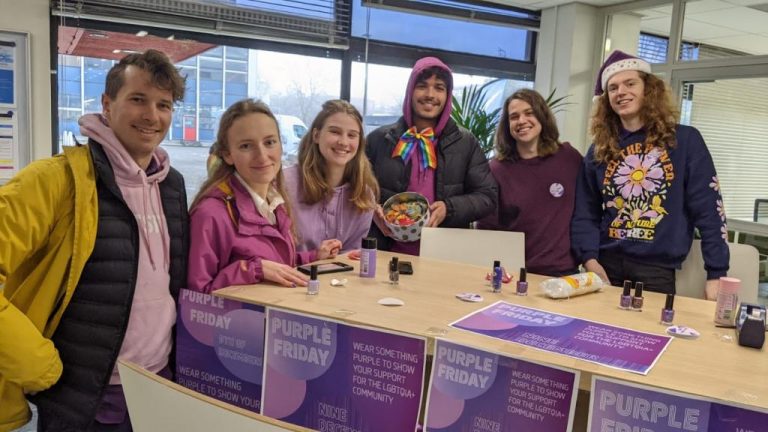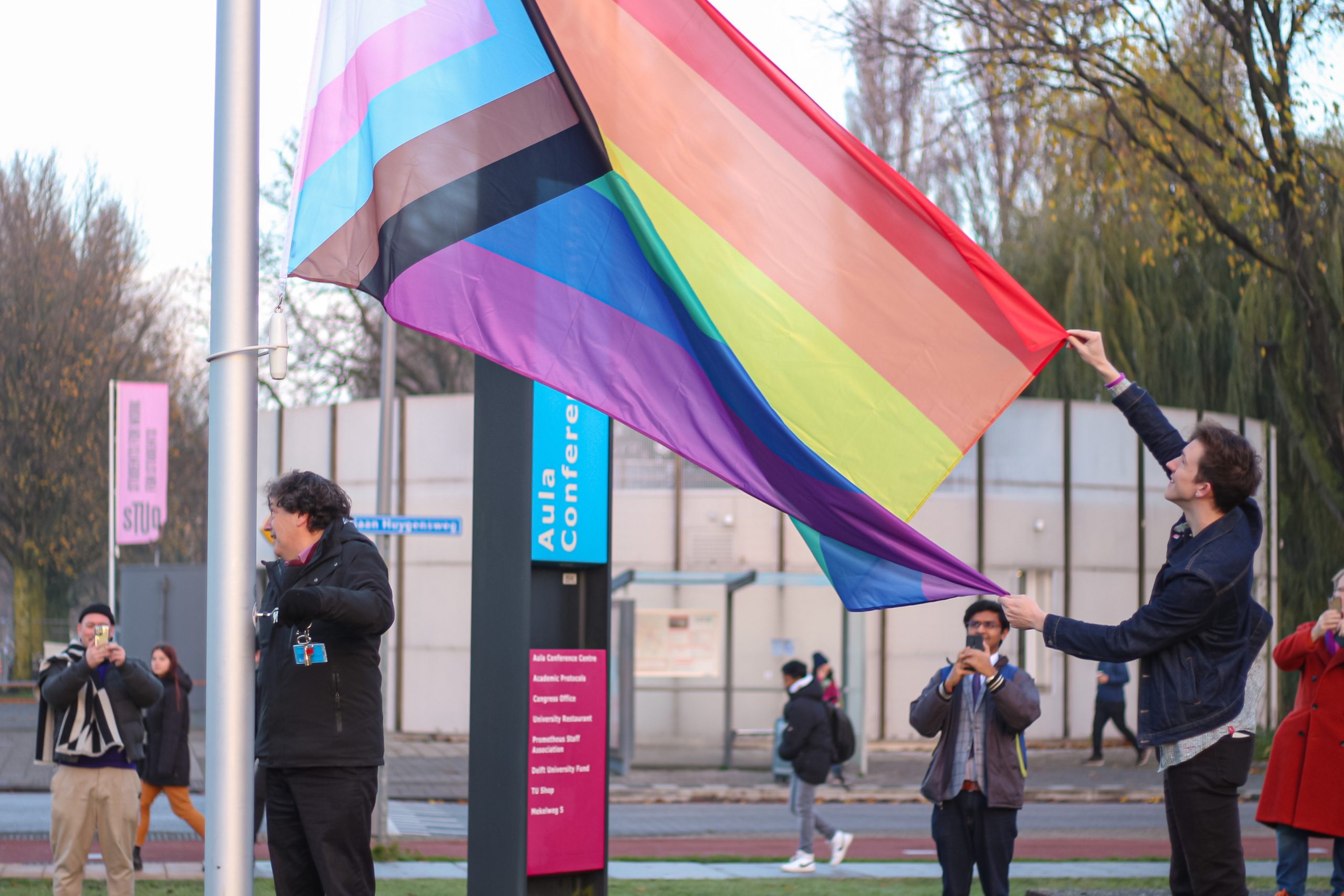Diversity & Inclusion Officer David Keyson raised the progress flag on Purple Friday. This replaces the rainbow flag that has hung in the Aula since July.
David Keyson (left) raises the progress flag. (Photo: Justyna Botor)
On top of the rainbow colours, the progress flag has white, pink, light blue, black and brown stripes. TU Delft says that the flag is ‘a more inclusive symbol than the current rainbow flag as it explicitly represents people of colour and non-binary and transgender people, apart from all the other members of the LGBTIQ+ community’.
Diversity & Inclusion Officer David Keyson raised the flag on Friday 9 December, Purple Friday, in front of the Aula. The rainbow flag had hung there permanently since July. TrueU, the LGBTIQ+ network for TU Delft staff, was one of the organisations that came up with the idea to replace the flag. It changed its own logo to the progress colours.
In an open letter (in Dutch), representatives of TrueU, the Central Student Council, and the Outsite students association, stated that raising the flag every day is important, espcially for international students. ‘The power of a symbol like the rainbow flag, or preferably an even more inclusive symbol, cannot be overestimated for this group as it shows that everyone is welcome and supported at TU Delft.’
TrueU, the Central Student Council, and Outsite, the LGBTIQ+ students association, cite examples of intolerance inside and outside the Netherlands. They include the example of the signing of a manifesto (in Dutch) by a professor emeritus at the Faculty of Architecture and the Built Environment against relaxing the Transgender Act. They also state that it is a ‘missed opportunity’ that the rainbow flag is not raised at set times at all faculty buildings, and that the preference would now be that the progress flag be raised.

The signatories of the open letter on the progress flag (from left to right): Laurens Weijs of Outsite, Abdelkader Karbache of the Central Student Council (Lijst Bèta) and Julien van Campen of TrueU. (Photo: Justyna Botor)
They now propose that this be done three times a year at all faculty buildings on the International Day Against Homophobia and Transphobia on 17 May, Coming Out Day on 11 October, and on the second Friday of December, Purple Friday. According to Abdelkader Karbache, diversity and inclusiveness representative of the Central Student Council and Lijst Bèta member, discussions with TU Delft on this are ongoing.
TU Delft has taken part in Purple Friday since 2019. On this day, people express their solidarity with young people who are lesbian, homosexual, bisexual, transgender, non-binary, intersex or queer by wearing purple clothing. Karbache says that the Day is also celebrated at many study associations at TU Delft. “EEMCS and 3mE have purple nail polish stations on that day for example.”

Purple nail polish stations at the Faculty of Mechanical, Maritime and Materials Engineering. (Photo: Laurens Weijs)

Purple nail polish stations at the Faculty of Electrical Engineering, Mathematics and Computer Science (EEMCS). (Photo: Laurens Weijs)
Delta published articles about diversity and inclusion this week:
- Figureheads of diversity policy need to be thick-skinned
- How hot topic issues dominate the debate on diversity and inclusion
- Diversity and inclusion in facts and figures
- How can TU Delft also be a place for neurodivergent students?
- Why diversity policy goals and effects need to be clearer
Do you have a question or comment about this article?
s.m.bonger@tudelft.nl


Comments are closed.